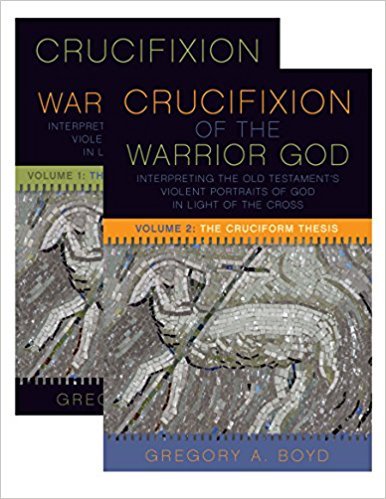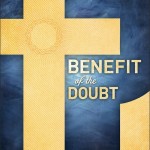We run our website the way we wished the whole internet worked: we provide high quality original content with no ads. We are funded solely by your direct support. Please consider supporting this project.

Reviewing the Reviews: Tom Belt (Part 2)
- In my previous post I reviewed Tom’s critical review of volume 1 of CWG, and in this post I’d like to do the same for his critical review of volume 2. As he did in his review of volume I, Tom begins with some praises and points of agreement. He thinks my quest to discern “what else is going on” with the cross and with Scripture’s violent divine portraits is right on. And he appreciates the pastoral heart that permeates this work as well as the fact that I’m willing to “dive into the deep end of the pool” and take on the tough issues. I appreciate these affirming words.
But that’s pretty much were the Honeymoon ends. Sigh…I suppose it was inevitable. ;-)
In what follows I’ll respond to five criticisms Tom raises against volume II.
- I begin the second volume of CWG with an imaginary story about seeing my wife Shelley on the opposite side of a street slapping and kicking a panhandler. Since I know Shelley is a kind and compassionate individual, I have to assume that something else is going on that explains her apparently violent behavior. Perhaps she is part of a sociological experiment or she’s been recruited to play this role for a reality TV show, for example. Tom argues that since Shelley is “actually slapping” the panhandler, I’m illustrating “the Synthesis Solution” which I earlier had argued against (vol.1, ch.9). And so, he concludes, “the analogy Greg opens vol. 2 with undermines everything.”
Response: All analogies break down at some point. That’s why its an analogy, not a literal identification. If A is an analogy of B, A is similar to B in certain respects, but also dissimilar to B in other respects. The key to understanding an analogy, therefore, is to know how A is like and unlike B.
As I state in CWG vol.2 (630-33), the point of my opening analogy is to capture the kind of reasoning that I’ll be utilizing throughout volume 2. It’s called “abductive reasoning,” and it works by postulating a story which, if true, explains otherwise puzzling data. Shelley’s apparently cruel behavior would certainly be puzzling to me, so I would have to assume that something else is going on to explain it. So too, since we know God in Christ, we must assume that something else is going on when God appears to act violently in the OT. That is the point of the analogy.
But like all analogies, this one fails at some point. And, to avoid the very criticism that Tom raises, I specify where this point is. “[W]hile Shelley actually engaged in apparently cruel behavior in my story,” I note, “I will argue that Yahweh only appeared to engage in violent behavior in the minds of the people he worked with…” (633). I thus cannot agree with my friend that my opening analogy “undermines everything.”
- I argue that on the cross Jesus bore our sin and experienced the God-forsaken death consequences that are intrinsic to all sin. This implies that there was a hiatus in Jesus’ experience of being united with the Father and Spirit, and this Tom finds hugely objectionable. I mean, HUUUGELY objectionable! Tom argues that this constitutes a “departure of [Greg’s] earlier (well-argued) work for which he offers no line of reasoning.” Moreover, it implies that “[n]othing about God’s experience of himself as essentially triune constitutes the loving character of God’s actions.”
Response: If Tom is arguing that I offer “no line of reasoning” as to why I departed from my doctoral dissertation, he’s absolutely right. And as I argued in my previous post, the reason is that I am not convinced I have in fact departed substantially from my dissertation. But, truth be told, it would not bother me in the least if I did.
On the other hand, if Tom means I offer “no line of reasoning” as to why I believe Jesus actually experienced God-forsakenness on the cross, he’s wrong. I can only encourage him to reread vol.2, 767-778 as well as vol.1, 153-160.
But does affirming the authenticity of Jesus’ cry of forsakenness mean that “[n]othing about God’s experience of himself as essentially triune constitutes the loving character of God’s actions”? The answer is, of course not. If God’s triune essence is love, God must experience God’s triune self as perfectly loving.
Having said this, I suspect that on this point Tom has in fact sniffed out one significant way my perspective has changed since I wrote my dissertation some thirty years ago. As a graduate student I was quite confident that metaphysical reasoning could bring us to an understanding of what the unsurpassably intense experience of love on the part of the three divine Persons must be like. I now believe we need to anchor all of our reasoning about God in the crucified Christ and only then work out its metaphysical implications. And since the crucified Christ reveals what God is like, precisely when he cries out, “My God my God,” I have to conclude that experiencing God-forsakenness is apparently not incompatible with God’s experience of himself as perfectly loving. Indeed, as I argue in the pages cited earlier, I consider this cry to be a perfect expression of the other-oriented love that eternally unites the triune God.
Now, Tom has questioned my intellectual integrity since I don’t explain how a hiatus in the experienced unity of God is compatible with God’s experience of himself as perfect love. I just don’t see how this follows. Even if I had to play “the mystery card” at this point, I don’t see why this would compromise my intellectual integrity. But as a matter of fact, I don’t think this is necessarily all that hard to understand.
Tom seems to think the perfect uniting love of the triune God would be broken if the three Persons aren’t each experiencing unsurpassably intense moment-by-moment bliss. But perhaps God’s inner life is a bit more complex than this. Perhaps the unsurpassably intense experience of triune love is more like experiencing a symphony, the enjoyment of which is increased precisely because there are dramatic variations in sound, volume, cadence, and feeling. It is because the moment-by-moment experience of the symphony varies that the symphony as a whole is enjoyable. So perhaps we shouldn’t think of the Trinity’s supreme experience of love ad intra so atomistically. Might God’s inner loving triune relationship contain a complexity similar to experiencing a symphony?
The topic warrants much more development, but to do so would take my review of Tom’s review off course – on a topic that is not all that central to CWG and that already has received more attention than I’d like to give it. Unfortunately, Tom’s comments on this particular disagreement didn’t end here. Indeed, all of his remaining critiques of CWG are simply variations of this same disagreement!
- Tom argues that my view of how the cross saves us “falls apart in the end,” for “if the consequences of godforsakeneness (estrangement from God) are intrinsic to our sinful choices,” he argues, “then by definition they aren’t something that can be borne by another.”
Response: I’ll offer three points here. First, if I held that our guilt was somehow transferred to Jesus, as the penal substitution view holds, I think Tom’s objection would stand. But as Tom knows, this is a view I explicitly reject.
Second, I am far more confident that Scripture teaches that Jesus did bear the death-consequences of our sin (e.g., Isa 53:4-5, 11-12; 2 Cor 5:21; Gal 3:13; I Pet 2:24) than I am in the correctness of Tom’s argument that these consequences “by definition” can’t be borne by another. (Note: I interpret “bearing our sin” in an organic rather than a judicial way, which is one way my view differs from the penal substitution model).
Lastly, I don’t think it’s all that difficult to understand how one could bear the consequences of another’s sin. Off the top of my head: Joe gets drunk and foolishly passes out on train tracks. From a distance Bill sees Joe lying on the train tracks but also sees a train is soon going to come around a bend and hit Joe unless he can get to him first. Bill races frantically and manages to save Joe, but he unfortunately gets struck and killed by the train in the process.
Bill suffered the consequences that were intrinsic to Joe’s choices. So too, Jesus suffered the death consequences of sin when he stood in our place on Calvary. There is a substitutionary death, but it has nothing to do with Jesus taking on our guilt or the Father venting his wrath on Jesus. (By the way, this conception of intrinsic consequences is wrapped up in the intrinsically relational ontology of the Hebraic worldview which I discuss in chapter 23.)
- Tom argues: “it is not at all clear how God’s triune experience being reduced to the estrangement that is the consequence of our sin actually does the work of saving us from that estrangement. Greg doesn’t explain. What happens objectively when God’s experience of himself is reduced to our despair and estrangement?” Is something paid for? Is there a transfer? An imputation? If the necessity for God’s triune self-estrangement derives from the nature of our bondage to sin and not from anything about God, then we should expect some explanation of how that estrangement grounds our release from sin and freedom to grow in love.”
Response: First, it is a caricature of my view of Jesus’ experience of forsakenness as well as most of the many theologians and Bible scholars who agree with it (see CWG vol. 2, 770-76) to say that “God’s triune experience” was “reduced to “the estrangement” of the cross or “to our despair and estrangement.”
All of us who believe Jesus experienced the estrangement from God that is intrinsic to sin would grant that the triune experience was affected by Jesus standing in our place as a sinner, but “affected by” and “reduced to” are two very different things. And, to turn things around for a moment, if Tom believes that the essence of God’s blissful other-oriented love was not affected by Jesus’ suffering on the cross, one has to wonder how Jesus’ suffering on the cross truly reveals the essence of God’s other-oriented love.
Second, if I understand Tom’s question correctly, I am frankly nonplussed how he can ask it. And I’m particularly baffled that he wonders if I believe there was “something paid for,” or something “transferred” or something “imputed” when Jesus stood in our place. These are all penal substitutionary concepts, and Tom himself acknowledges that I explicitly reject this view.
Beyond that, throughout volume 2 (but also somewhat in volume 1), I repeatedly emphasize why God had to stoop to experience his own antithesis (viz. becoming our sin and our God-forsaken curse), and I repeatedly talk about what this “objectively changed.” Among other things, I hold that only this unsurpassable expression of love could vanquish the kingdom of darkness, dispel all false conceptions of God that kept us in bondage, eliminate everything Satan had on us, open the door for us to receive God’s forgiveness, and liberate and transform humanity and creation (see e.g. CWG, 765; 1055; 1059-62; 1065-66). This is what “objectively changed.” Basically everything!
Now, if Tom is asking me for a metaphysical explanation as to how this unsurpassable expression of love vanquishes the kingdom of darkness, etc., I can only resort to analogies, as I do throughout CWG. For example, as it lies in the nature of light to dispel darkness and truth to dispel lies, so it lies in the nature of love to overcome evil. To say more than this, at this point in my life, is above my pay grade.
On the other hand, it should be noted that this is hardly unique to the Christus Victor view of the atonement. All atonement theories – indeed, I would argue this for all major theories about fundamental aspects of reality — eventually come to a point where explanations must give way to descriptions.
In other words, the ultimate “explanation” inevitably is some version of, “because it lies in the nature of things.”
- If God doesn’t require a sacrifice to forgive, which I grant, then Tom wonders what the point of Jesus’ God-forsaken death even is. “What kind of knotty, confused metaphysics supposes that God can forgive us without sacrificing his own internal triune happiness, but cannot be present in our lives in transforming ways without having our sin wrest his happiness and beatitude from his heart and reduce him to our despair and godforsakeness?”
Response: If you’re beginning to wonder if Tom was reviewing CWG or some other book I wrote on the atonement, join the club!
Nevertheless, the first thing I’d like to do by way of response is to once again note the caricature of my position. I have never said that the Trinity was reduced to “our despair and godforsakeness”!
Second, Tom apparently believes that the only reason Jesus would ever need to suffer God-forsakenness would be to satisfy God’s wrath so he could forgive us. This perhaps explains why, even though Tom knows I vehemently reject penal substitutionary atonement, he nevertheless repeatedly ascribes something like this view to me, both in this review and on other sites. For example, he describes one who holds my view as “somebody who needs God to be reduced to his own suffering before he’ll let himself rest in the forgiveness that’s his.” So too, he insists my view is another version of “scapegoating.”
This just tells me that Tom is reading my talk about Jesus’ experience of forsakenness through a penal substitutionary grid. His numerous critical comments along these lines apply to that view, but not to mine.
Third, according to Tom, to think that Jesus needed to enter into solidarity with our sin and experience God-forsakenness for any reason other a penal sacrifice is to espouse some “kind of knotty, confused metaphysics.” If so, then it seems to me that Tom must concede that all advocates of the Christus Victor understanding of the atonement – including the majority of theologians in the early church — advocated a “knotty” and “confused” metaphysics. For all these have held that Jesus had to stand in our place, but none held that he did so as a sacrifice that allowed God to love and forgive us.
In fact, it seems to me that the logic of Tom’s critique would require him to say that any who hold that it was necessary for Jesus to suffer for us to be saved have a “knotty” and “confused metaphysics.” How precisely one interprets that suffering – viz. whether Jesus experienced God-forsakenness or not – is really beside the point. Now, Tom is free to believe this if he so chooses, but this entails that he is judging the vast majority of theologians throughout church history to be guilty of espousing a “knotty” and “confused metaphysics” by doing so.
The final thing I’ll say about Tom’s review is also my most fundamental problem with it. I think it’s fair to say that, judging from his critique of volume 2, you’d easily get the impression that CWG was mostly about Jesus’ experience on the cross, or at least that the thesis of this work was entirely dependent on my interpretation of Jesus’ experience on the cross. But this is not at all the case.
The discussion where I unpack my understanding of Jesus’ God-forsakenness occupies eleven pages of an almost 1500 page work (767-778). On top of this, my particular understanding of Jesus’ experience isn’t even the main point of the principle it supports– The Principle of Redemptive Withdrawal. The main point is about how the Father brings about divine judgments: namely, by withdrawing divine protection and turning people over to suffer the self-destructive consequences of their sin.
On top of this, I can think of ways that a person could embrace the Principle of Redemptive Withdrawal without agreeing with my interpretation of Jesus’ experience on the cross. And there is absolutely no problem with someone disagreeing with my understanding of Jesus’ forsakenness but nevertheless accepting the other three principles that comprise the Cruciform Thesis (and take up the remaining three quarters of volume two).
All this to say: Tom’s review focused almost exclusively on a point that represents a fragment of CWG and that is not essential to its central Thesis. I can’t say I understand it, but it’s clear that believing in the unaffected moment-by-moment blissful experience of perfect love on the part of the Father, Son and Spirit – even while Jesus is crying in agony on the cross – is a deeply cherished belief of Tom’s. And I totally understand the passion one can feel when this deeply cherished belief is being undermined– especially from one who used to believe in it.
This passion is clearly reflected in Tom’s narrowly focused review of volume 2. Unfortunately, this means that his critique of volume 2 tells you a lot about how dearly Tom holds to the uninterrupted nature of God’s triune experience. What it won’t tell you much of is what Tom thinks about the multitude of other topics that were covered in this volume. And that, I think, is a pity.
Category: General
Tags: Crucifixion of the Warrior God, Cruciform Theology, Tom Belt
Topics: Biblical Interpretation
Related Reading

Benefit of the Doubt Is Here!
Benefit of the Doubt is finally here and you should definitely get yourself a copy! Frank Viola interviewed Greg about the book recently and you can read it over on Frank’s blog Beyond Evangelical. In fact, Frank is so enthusiastic about the book that he added it to his Best 100 Christian Books Ever Written list. Wow. Also,…

The Centrality of Christ in Hebrews, Part 1
The intense Christocentricity that the New Testament writers embrace is nowhere more clearly and consistently illustrated than in the book of Hebrews. Throughout this work we find a repeated emphasis on the many ways the revelation given to us in Christ surpasses that of the Old Testament. The author begins by stressing how the revelation…

How the Church is Tempted to “Do Good”
The previous post spoke of God’s call to the church to be resident aliens: a holy, distinct people who are set apart and peculiar when compared to the patterns of the world. The holiness of God’s kingdom is cruciform love, which constitutes our distinct witness to the world. Preserving this holiness and resisting the Devil’s…

God’s Moral Immutability
Classical theologians from the fourth and fifth centuries on were very concerned with protecting their understanding of the metaphysical attributes of God—like timelessness, immutability, impassibility—by assessing biblical portraits that conflicted with these attributes to be accommodations. However, once we resolve that all our thinking about God must be anchored in the cross, our primary concern…

How Job’s Suffering Points to Jesus
As I introduced in my previous post, when we read the book of Job we must refute the common assumption that Yahweh is a Machiavellian deity who is controlling all that transpires in his creation, including Job’s suffering. At the same time, we must ask why the prologue (1:11-2, 2:3) and perhaps the final chapter…

When Jesus Referred to Canaanites as “Dogs”
Last week I discussed Paul’s harsh language regarding his opponents, the worst example being his reference to certain opponents as “dogs” (Phil 3:2). I suggested that such language simply reflects the fact that Paul wasn’t perfect, as he himself admitted. Several people pushed back on this suggestion by pointing out that Jesus once referred to…
